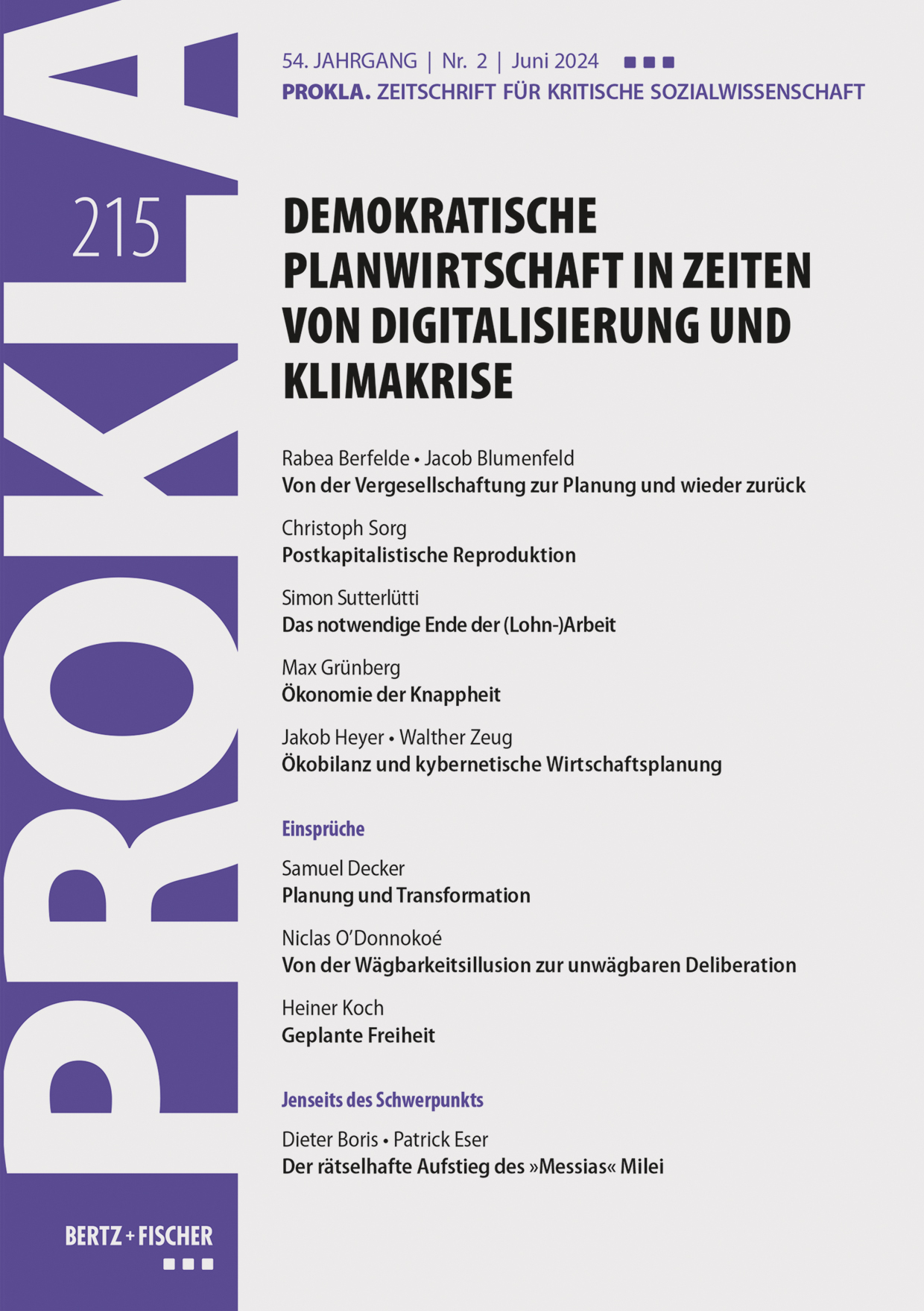Planned Freedom
DOI:
https://doi.org/10.32387/prokla.v54i215.2117Keywords:
Freedom, Planned EconomyAbstract
A planned economy is often criticized as restricting freedom and is at best justified based on efficiency considerations. However, it can be shown that a planned economy realizes the important collective freedom of being able to consciously shape the economy. This overcomes the constraints of the market as a source of lack of freedom. A major challenge now lies in shaping the collective freedom of the planned economy in such a way that individual freedoms can be optimally realized at the same time. However, it will be unavoidable to weigh up the realization of individual and collective freedoms.
Downloads
References
Berlin, Isaiah (1969): Four Essays on Liberty. Oxford.
Cockshott, Paul / Cottrell, Allin (1993): Towards a New Socialism. Nottingham.
Dapprich, Jan Philipp (2022): Optimal Planning with Consumer Feedback: A Simulation of a Socialist Economy. In: Review of Political Economy 35(4): 1136-1156. DOI: https://doi.org/10.1080/09538259.2021.2005367. DOI: https://doi.org/10.1080/09538259.2021.2005367
Devine, Pat (1998): Democracy And Economic Planning. The Political Economy Of A Self- Governing Society. Cambridge.
Goldman, Emma (1925): My Disillusionment in Russia. London.
Graf, Jakob (2021): Macht der Märkte oder Macht in Märkten? Zur Bedeutung von Asymmetrien in der Zirkulationssphäre. In: PROKLA 205 51(4): 699-717. DOI: https://doi.org/10.32387/prokla.v51i205.1965. DOI: https://doi.org/10.32387/prokla.v51i205.1965
Hahnel, Robin (2021): Democratic Economic Planning. London. DOI: https://doi.org/10.4324/9781003173700. DOI: https://doi.org/10.4324/9781003173700
Haslanger, Sally (2004): Oppressions: Racial and Other. In: Levine, Michael / Pataki, Tamas (Hg.): Racism, Philosophy, Mind: Philosophical Explanations of Racism and Its Implications. Ithaca: 97-123.
Koch, Heiner (2024): Vergesellschaftung als Entprivatisierung. In: Zeitschrift für politische Theorie 15(2) (im Erscheinen).
Laibman, David (2012): Political Economy after Economics. Scientific Method and Radical Imagination. London/New York. DOI: https://doi.org/10.4324/9780203807781. DOI: https://doi.org/10.4324/9780203807781
Loick, Daniel (2017): Juridismus: Konturen einer kritischen Theorie des Rechts. Frankfurt/M.
Lovett, Frank (2018): Non-Domination. In: Schmidtz, David / Pavel, Carmen. E. (Hg.): The Oxford Handbook of Freedom. Oxford: 106-123. DOI: https://doi.org/10.1093/oxfordhb/9780199989423.013.3. DOI: https://doi.org/10.1093/oxfordhb/9780199989423.013.3
– (2022): The Well-Ordered Republic. Oxford. DOI: https://doi.org/10.1093/oso/9780192859556.001.0001. DOI: https://doi.org/10.1093/oso/9780192859556.001.0001
Mader, Dimitri Isabel (2023): Herrschaft und Handlungsfähigkeit im Kapitalismus: Bedeutung und Grenzen der »Macht des Kapitals« für eine soziologische Analyse von Macht und Herrschaft im Kapitalismus. In: PROKLA 211 53(2): 361-381. DOI: https://doi.org/10.32387/prokla.v53i211.2043. DOI: https://doi.org/10.32387/prokla.v53i211.2043
Mau, Søren (2021): Stummer Zwang. Eine marxistische Analyse der ökonomischen Macht im Kapitalismus. Berlin.
MEW – Marx, Karl / Engels, Friedrich: Marx-Engels-Werke. Berlin 1956ff.
Mozorov, Evgeny (2023): Wir brauchen einen Nicht-Markt-Modernismus. In: Jacobin (18.12.2023). URL: https://jacobin.de/artikel/nicht-markt-modernismus-morozov, Zugriff: 26.3.2024.
Müller, Mirjam (2021): Who cares? Market socialism and social reproduction. Review of Social Economy 79(3): 454-475. DOI: https://doi.org/10.1080/00346764.2020.1830157. DOI: https://doi.org/10.1080/00346764.2020.1830157
O’Brien, Michelle E. (2023): Family Abolition: Capitalism and the Communizing of Care. London. DOI: https://doi.org/10.2307/jj.3508398. DOI: https://doi.org/10.2307/jj.3508398
Palka, Przemys?aw (2020): Algorithmic Central Planning: Between Efficiency and Freedom. Law and Contemporary Problems 83 (2): 125-149.
Pettit, Philip (1997): Republicanism: a theory of freedom and government. Oxford.
– (2012): On the People’s Terms: A Republican Theory and Model of Democracy. Cambridge. DOI: https://doi.org/10.1017/CBO9781139017428. DOI: https://doi.org/10.1017/CBO9781139017428
Phillips, Leigh / Rozworski, Michael (2019): The People’s Republic of Walmart: How the World’s Biggest Corporations are Laying the Foundation for Socialism. London.
Postone, Moishe (2003): Zeit, Arbeit und gesellschaftliche Herrschaft. Eine neue Interpretation der kritischen Theorie von Marx. Freiburg im Breisgau.
Rocker, Rudolf (1921): Anarchismus und Organisation. Der freie Arbeiter. Berlin.
Säuberlich, Walter (1969): Freiheit – Planung – Sozialismus. Deutsche Zeitschrift für Philosophie 17(5): 547-566. DOI: https://doi.org/10.1524/dzph.1969.17.5.547
Saros, Daniel E. (2014): Information Technology and Socialist Construction: The end of Capital and the transition to socialism. London/New York. DOI: https://doi.org/10.4324/9781315814001. DOI: https://doi.org/10.4324/9781315814001
Skinner, Quentin (1997): Liberty before Liberalism. Cambridge. DOI: https://doi.org/10.1017/CBO9781139171274. DOI: https://doi.org/10.1017/CBO9781139171274
Söder, Günter (1960): Freiheit und sozialistische Planwirtschaft: Zur Auseinandersetzung mit dem Bourgeoissozialismus in der SPD. Deutsche Zeitschrift für Philosophie 8(6): 637-656. DOI: https://doi.org/10.1524/dzph.1960.8.6.637. DOI: https://doi.org/10.1524/dzph.1960.8.6.637
Van Parijs, Philippe (1995): Real freedom for all: What (if anything) can justify capitalism? Oxford.
Weiß, Friedrich (1922): Sozialisierung – Wege und Ziele. Wien.
Wootton, Barbara (1948): Freiheit in der Planwirtschaft. Hamburg.
Young, Iris Marion (2010): Responsibility for justice. Oxford.
Zuboff, Shoshana (2018): Das Zeitalter des Überwachungskapitalismus. Frankfurt/New York.






